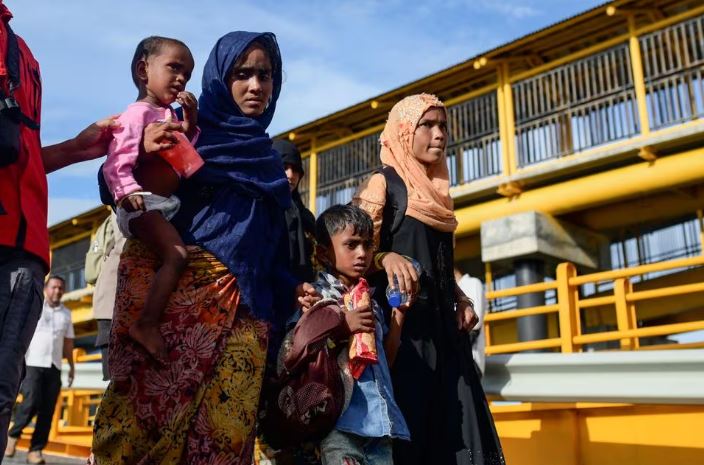
Published :
Updated :

Instability never leaves Myanmar. Since its birth as an independent country, it has never been a stable democracy. The situation worsened when army started ruling the country. And right now, armed conflict is raging between the army government and pro-democratic groups in that country.
But this time Bangladesh is also bearing the brunt of the domestic infighting of Myanmar. This week, during a heavy fighting between the Myanmar security forces and the insurgent Arakan Army near the Bangladesh border, two people in Bangladesh were killed by the mortar shells fired from a place inside Myanmar.
At the same time, more than 100 members of the Myanmar Border Guard Police and military infiltrated Bangladesh in the face of attacks by the Arakan Army forces.
No doubt, the overall situation of Myanmar is becoming more complicated and many predict the days of the present military regime is numbered.
Now, the question is-- what does it mean for Bangladesh, which has been carrying a huge burden of more than one million Rohingyas?
Rohingya repatriation is now a top priority issue for Bangladesh. Since the beginning of the latest spell of Rohingya crisis in 2017, Bangladesh has been in negotiation with Myanmar about the repatriation of the Rohingya.
Our foreign office stalwarts time and again have spelt out that Bangladesh wants to resolve the problem through peaceful means. According to them Myanmar military government had assured them of starting repatriation once stability returns to Rakhine State.
The reality is a large swath of land in the Rakhine State, across the Bangladesh border, is now under occupation of the Arakan Army. So, questions are being raised whether peace will return there in the immediate future or not.
Simultaneously, suggestions are being made that a move may be initiated to establish contact with the National Unity Government (NUG), a platform of the pro-democratic groups, which is leading the present armed movement against the present army government of Myanmar.
The NUG formed an armed wing called the People Democratic Force ( PDF) of which the Arakan Army is a close ally. The NUG has already committed to provide full citizenship to the Rohingyas and their interim administration includes several members from the Rohingya community.
International conventions do not allow interference in the domestic affairs of another country and these rules also bar supporting separatist movement of a country because territorial sovereignty of a member state of the UN must be protected.
However, there are also international rules that dictate members to do the needful to stop genocide, ethnic cleansing and to ensure repatriation of refugees.
Bangladesh must not deviate from its policy of peaceful solution to the Rohingya crisis but at the same time pushing through a backchannel parley through covert diplomacy with the NUG can be an option to expedite the repatriation process. A scenario under which the NUG or its allies take control of the Rakhine State is not as unrealistic as it was couple of years ago.
After all, PDF and the Arakan Army are gaining ground everyday in the fighting against the Myanmar armed forces, which to many is one of the strongest and ruthless armies in South Asia.
So, to get rid of the huge burden of the Rohingyas, and for their sustainable and dignified repatriation, covert diplomacy may not be a bad idea.
mirmostafiz@yahoo.com


 For all latest news, follow The Financial Express Google News channel.
For all latest news, follow The Financial Express Google News channel.